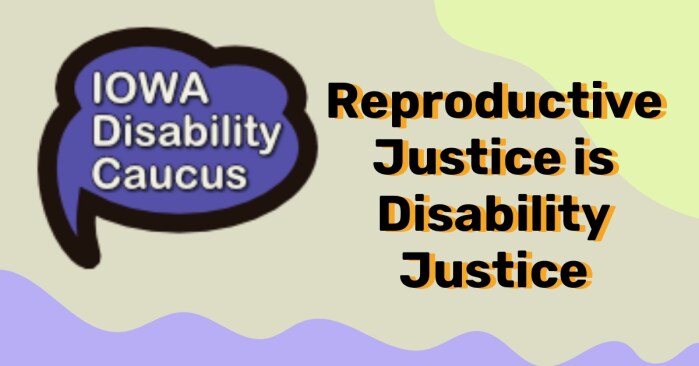Julie Russell-Steuart is a printmaker and activist who chairs the Iowa Democratic Party’s Disability Caucus. The Iowa legislature convenes on July 11 for a special session to pass a near-total abortion ban.
The disability community is one of the most impacted by the harmful and egregious proposed abortion ban. People with disabilities are more likely to have medical reasons to have an abortion that do not fit into any of the exemptions. Our medications can interfere with a successful pregnancy. We may not be physically able to carry a fetus to term, and the bill unfairly assigns that determination to medical provider, which will no doubt lead to inconsistent and life-threatening results for people with disabilities.
Like the 2018 law, the new bill contains no exception for emotional or psychological conditions or disabilities that can affect someone’s readiness to have a child—often a painful, careful personal decision. Its definition of “medical emergency” specifically excludes “the woman’s age” and “familial conditions” like access to a supportive environment in which to raise a child, or size of family.
It can be difficult to arrange travel to a clinic—even one nearby, and especially if it’s far away—for those who are mobility impaired. We all know that in recent years several rural Iowa hospitals have closed their maternity wards. This bill further erodes access to timely reproductive care by banning abortion after embryonic cardiac activity can be detected—which often occurs around six weeks, before most people know they are pregnant.
Regarding the bill’s exceptions: disabled people are more likely to be victims of sexual violence, three times more likely to experience rape or sexual assault, and almost twice as likely to experience domestic violence than non-disabled women. Most rapes and acts of incest are not reported, let alone reported within the limited time frame this bill requires (45 days for rape and 140 for incest), setting up an unacceptable level of trauma for Iowans.
Disability advocates often talk about paternalism and bias against disabled people. The paternalistic viewpoint says you are not in charge; someone else is in charge of your body and life. Disabled people have been fighting for bodily autonomy and the right to make medical decisions ourselves for a very long time. In other words, disability justice is and has been reproductive justice.
Each person’s situation is different. No law would fit everyone except one giving all the freedom to choose. The latest proposed abortion ban would be a terrible infringement on our bodily autonomy, and will lead to deaths, murders, and suicides.
We do not consent to laws that are twisted and manipulated to maintain power over us.
Every right we have fought for has been led by the marginalized and the oppressed. Feminists of color were early champions of the Reproductive Justice movement, begun in 1994.
It’s activists of color, it’s been disability activists, and now it’s all of us who need reproductive health care.
Every one of us is worthy of power over ourselves, our bodies, and our choices. Please see this bill for what it is: an outright theft of every person’s autonomy and a callous disregard for our lives.
Top graphic created by Julie Russell-Steuart and published with permission.

